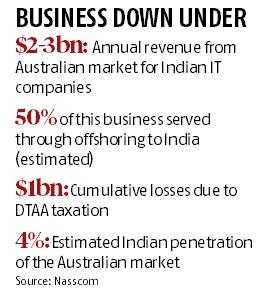Daily News
IT Companies Fume Over Double Taxation Avoidance Treaty With Australia
Information technology majors have blamed the current Double Taxation Avoidance Treaty (DTAA) with Australia as a major constraint on plans to grow operations Down Under.
Income from IT services is being taxed as royalties under the DTAA, industry body Nasscom has told the government. The loss for companies is estimated at $1 billion since 2012, along with related job losses. This comes at a time when services exporters have resisted government efforts to prod them into new markets, by pointing out that significant market access barriers in major markets like China exist.
DTAAs are tax treaties signed between two or more countries to help taxpayers avoid paying double taxes on the same income. It becomes applicable in cases where an individual is a resident of one nation, but has earnings in another.
The agreement with Australia has peeved the firms, especially because their income is not eligible to be taxed under Australian domestic content law, they argued. “The Australian Tax Office contends that Article 23 of the DTAA, read with their International Agreement Act 1953, amends their domestic law (which does not contain a provision to tax such services rendered overseas) to source such income to Australia and levy tax on,” industry body Nasscom told the commerce ministry in a presentation.
“The litigation process is complete with no recourse available now. The Australian authorities believe companies can get a relief in India. So, we have asked the government to either provide legal recourse or amend the DTAA, so that a considerable income is not simply drained away,” a senior Nasscom functionary said.

Signed in 1991, the DTAA has been a hit among Indian techies heading to work in Australia. Typically, benefits available under the DTAA include claiming credit of tax paid in Australia against tax payable in India on the doubly taxed income.
Over the past decade, the five major Indian IT players — Infosys, Wipro, Tata Consultancy Services (TCS), Tech Mahindra Satyam and HCL — have ramped up business in the country, forming partnerships with many of the top-100 companies on the Australian Securities Exchange, including National Australia Bank (NAB) and energy company AGL, according to the Australian Trade and Investment Commission. Significant investments in infrastructure, human resources, new services and the ICT industry itself has also been made since 2011 when the Australia government started wooed Indian firms. This was the time the combined revenues of the big five grew 26 per cent year-on-year.
India is the leading sourcing destination across the world, accounting for approximately 55 percent market share of the $185-190 billion global services sourcing business in 2017-18. India’s IT & ITeS industry grew to $181 billion in 2018-19. Exports from the industry increased to $137 billion in FY19, with experts believing it may over the next year drive services exports to become larger than merchandise exports, for the first time. Case in point, over the first four months of this financial year, services exports fetched $74.05 billion.
The IT sector accounts for largest share in total Indian services export, at 45 percent and the India Brand Equity Foundation estimates that IT exports will grow 7-9 percent year-on-year.
Overall spending on IT in India is expected to grow over 9 percent to reach $87.1 billion in 2018. For Australia, this figure stands at $48 billion, with Indian firms penetrating 4 percent of the market, according to Nasscom data.














You must be logged in to post a comment Login